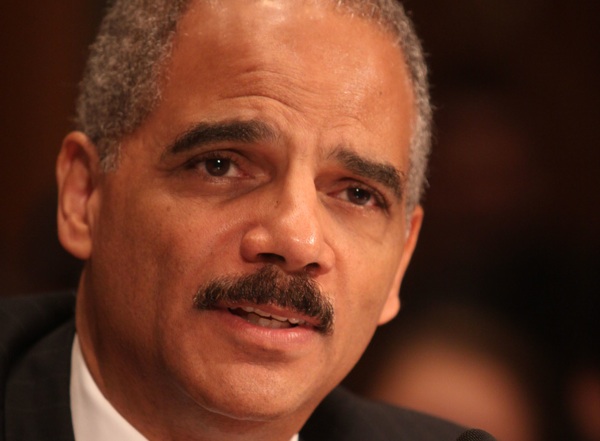Holder Struggles to Defend 9/11 Trial Decisions
This is war, said Sen. Jeff Sessions (R-Ala.). I think the decision you’ve made to try these cases in federal court represents a policy and political decision.
Jul 31, 202026.2K Shares486.3K Views
Attorney General Eric Holder (WDCpix)
Attorney General Eric Holder surely knew he’d be facing a tough audience when he prepared to testify to the Senate Judiciary Committee on Wednesday. That may be why instead of delivering the written testimony he’d prepared, he focused his opening remarks on explaining his decision, announced last Friday, to try the alleged co-conspirators of the September 11, 2001 terrorist attacks in a New York federal court.
But the Attorney General also announced last week his parallel decision to try five other terror suspects in the newly reconsistituted military commissions just authorized by Congress and signed by the President. Instead of pacifying Republicans, however, it has instead opened up Holder and the Obama administration to harsh criticism from both sides of the aisle. That quickly became clear in the aggressive, even hostile questioning from Republicans yesterday, and repeated expressions of disappointment from some Democrats.
In attempting to explain his decision at the justice department oversight hearing
Republicans, however, repeatedly cast the choice of a civilian trial as undermining the war on terror. “This is war,” said Sen. Jeff Sessions (R-Ala.), the ranking Republican on the committee. “I think the decision you’ve made to try these cases in federal court represents a policy and political decision.” Holder denied that politics had anything to do with it, and confirmed that he, too, believes we are “at war with a vicious enemy.” Yet the decision to continue to characterize the struggle against terrorism as a war left Holder struggling even more to explain his decision to choose a civilian trial over a military one for the men he believes sparked the whole conflict.
“Prosecuting the 9/11 defendants in federal court does not represent some larger judgment about whether we are at war,” he said. But “We need not cower in the face of this enemy.”
“It’s not cowering in fear of terrorists to decide the best way for this case to be tried is to be tried by military commissions,” Sessions retorted. “You’ve indicated the military commissions can be used. I assume you believe a military commission can fairly and objectively try certain of these cases.”
Holder affirmed that they can. But Sen. John Cornyn (R-TX) used that to argue that Holder was exercising bad judgment, because the evidence against Khalid Sheikh Mohammed and his co-conspirators now could all be thrown out in a federal court because they weren’t read their Miranda rights when they were seized.
Graham, in his questioning, noted that using two different justice systems will confuse military officers who capture terror suspects in the future. “Under your decisions, the point of trial would not be known,” he said. “So what should the military do at the point of capture? Custodial interrogation rights and Miranda rights attach at that time. But they’re not normally used by the military. What do we tell our soldiers and commanders when they capture somebody about how to interrogate and when to interrogate?”
Any lawyer defending a terror suspect captured on the battlefield in federal court, Graham argued, would argue that “questioning of my client without Miranda warnings would be a violation of domestic law.”
Holder assured Graham that Miranda warnings aren’t usually necessary when the military arrests a combatant overseas, although he acknowledged that the decision is made on a case-by-case basis, and did not explain how those decisions are made.
Many Senate Democrats, meanwhile, although supporting the decision to try the 9-11 suspects in federal court, were equally disturbed by Holder’s decision to use military commissions to try other detainees.
“I commend you for your decision” to try the 9/11 suspects in federal court, said Sen. Russell Feingold (D-Wisc.) “But I remain skeptical of the decision to try five others in military commissions.” Feingold noted that more than 200 terror suspects have been prosecuted in federal court since September 11, 2001, including Zacarias Moussaoui, the so-called 20th hijacker, who was charged and convicted in federal court by the Bush administration, with no objection from Republicans. Now, “it’s disheartening to hear that people have so little faith in our system of justice,” said Feingold.
Sen. Sheldon Whitehouse (D-R.I.), a former U.S. Attorney, added that unlike the federal court system, military commissions are an uncertain system of justice, even with the recent congressional amendments that reauthorized them. Under President Bush, the commissions convicted only three people, which included one guilty plea, Whitehouse noted, adding that he had doubts about the new commissions “being able to contribute same kind of reliabity and resilience that federal courts have obtained through tens of thousands of cases.” “Even a perfect military commission still bears some kind of question,” he said. “They are still untested.”
The result is that their verdicts are likely to be appealed, which will only “lead to delay in the outcome of the proceedings,” said Dick Durbin (D-Ill.).
Sen. Patrick Leahy (D-Vt., the committee chair, echoed that worry. “The concern I have is that military commissions have repeatedly been overturned by the Supreme court and have very little precedent,” he said. By contrast, “our federal courts have 200 years of precedent.”

Rhyley Carney
Reviewer
Latest Articles
Popular Articles
